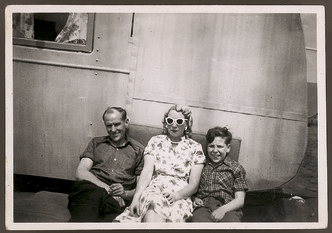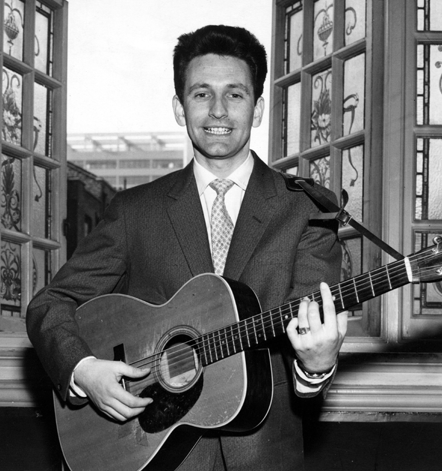So just how grey were the 1950s? "It was grey," said Bruce Welch of The Shadows. Au contraire, said Joan Bakewell, the Fifties were "giddy and full of optimism." Veteran journalist Katharine Whitehorn added that not only were the Fifties not boring, but that even then people had already heard of sex.
But this was Tom Jones's film, and in his view "the early Fifties were grey and boring and flat." Born in June 1940, the then Thomas Woodward spent his formative years in Pontypridd, and in the foggy old films and photos of it included here the town resembled some ghastly failed experiment in Stalinist Siberia.
 However, as this informative, entertaining and even inspiring film illustrated, nothing was going to stop the ebullient Jones from bursting out from coal-dust-coated, small-town anonymity. Everybody in his family sang, especially at family parties on Saturday nights (his dad did a mean "Besame Mucho"). His Uncle Georgie taught him a vital lesson in communication – "look at me when you're singing," he insisted. Confined to bed for two entire years with tuberculosis, Tom made the most of it by soaking up pop music on Radio Luxembourg (the BBC didn't do pop music then) and stealing tips from Frankie Vaughan on the family's new telly (Jones on a family seaside holiday in the '50s, above).
However, as this informative, entertaining and even inspiring film illustrated, nothing was going to stop the ebullient Jones from bursting out from coal-dust-coated, small-town anonymity. Everybody in his family sang, especially at family parties on Saturday nights (his dad did a mean "Besame Mucho"). His Uncle Georgie taught him a vital lesson in communication – "look at me when you're singing," he insisted. Confined to bed for two entire years with tuberculosis, Tom made the most of it by soaking up pop music on Radio Luxembourg (the BBC didn't do pop music then) and stealing tips from Frankie Vaughan on the family's new telly (Jones on a family seaside holiday in the '50s, above).
His life was changed by rock'n'roll. Jones didn't just describe the impact of Bill Haley's "Rock Around the Clock". He put the 45 on the record player, and was punching the air and bellowing the words as Haley's slab of souped-up jump blues pumped out of the loudspeaker. "It hit me like a ton of bricks," he said, and you could see he wasn't exaggerating. How he managed to summon up any enthusiasm for the 14th-generation hand-me-downs on The Voice is anybody's guess.
It seems he never had any doubt that he would escape from Pontypridd. When Elvis Presley burst through so cataclysmically, it was as if somebody had fired the starting pistol, and soon Jonesy was playing his first-ever gig at the Wood Road Working Men's Club, where the older folks used to put on their best suits to go drinking on Saturday nights. As Bruce Welch splendidly put it, "We all looked like Bill Gates and then Elvis came along." Then it was London, New York, Vegas...

If Elvis did it for Jones, for Jim Carter it was Lonnie Donegan. The King of Skiffle (or "skittle" as one of Carter's interviewees would have it) is not de rigueur with today's fashionable movers and shakers, but Carter evoked his memory with real affection. Moreover, he'd rounded up a powerful guest-list to support his contention that Donegan was "the greatest".
It seems few doors remain closed to Downton's butler. Former skifflers Paul McCartney (pictured above left with Carter) and Joe Brown eagerly quoted the lyrics from Lonnie's hit "Rock Island Line", and Ringo Starr played the washboard. Roger Daltrey hailed the liberating spirit of Lonnie's music and recalled how, at the height of Lonniemania, every street in Shepherd's Bush had its own skiffle group. Carter had secured an interview with Donegan supporter and ex-skiffler Van Morrison (generally regarded as a snarling curmudgeon by the press, but here the acme of affability). He had even travelled to Nashville to interview Jack White. "It was expressing emotion in a really wild way," said Jack, of Donegan's music (though not "My Old Man's a Dustman", obviously). "That's a very dangerous place to be" (Donegan pictured below).
 Carter's gentle but genuine enthusiasm was infectious. There was an amusing scene where Mrs Carter, Imelda Staunton, described not being at all chuffed at being invited to a Donegan gig by her husband, but apparently thought better of Lonnie having done so. Carter himself answered a question many of his viewers were surely asking when he constructed the "tea chest bass" so indispensable to performances in the skiffle genre.
Carter's gentle but genuine enthusiasm was infectious. There was an amusing scene where Mrs Carter, Imelda Staunton, described not being at all chuffed at being invited to a Donegan gig by her husband, but apparently thought better of Lonnie having done so. Carter himself answered a question many of his viewers were surely asking when he constructed the "tea chest bass" so indispensable to performances in the skiffle genre.
Like Tom Jones's film, what came across was how incredibly everything has changed since the Fifties, and yet the primal impact of early rock'n'roll (or indeed skiffle) remains as thrillingly vivid to its converts today as it ever was. In a seaside teashop in Norfolk, Jim Carter delivered a touching benediction. "He was the king of skiffle and he changed music in this country, and for that Lonnie I thank you."















Add comment